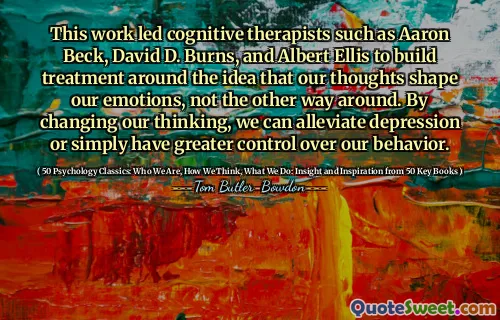
This work led cognitive therapists such as Aaron Beck, David D. Burns, and Albert Ellis to build treatment around the idea that our thoughts shape our emotions, not the other way around. By changing our thinking, we can alleviate depression or simply have greater control over our behavior.
The quote emphasizes a fundamental principle of cognitive therapy, which revolutionized how mental health professionals approach emotional well-being and behavioral change. It highlights that our emotions are not uncontrollable reactions to external events, but rather, they emerge from our thoughts and interpretations of those events. This perspective empowers individuals, offering them agency rather than victimhood in their emotional experience. Knowing that by adjusting our thought patterns, we can influence how we feel and act, challenges long-held beliefs that emotions are fixed or automatic.
This idea also reflects a broader philosophical perspective on the mind and self-regulation. It underscores the importance of self-awareness and cognitive restructuring as tools for mental health recovery and personal growth. The work of pioneers like Aaron Beck and Albert Ellis laid the groundwork for therapies like cognitive-behavioral therapy (CBT), which have been empirically validated as effective treatments for depression and anxiety among other conditions.
Moreover, beyond clinical applications, this insight into cognition and emotion resonates with everyday life. It encourages mindfulness of our internal dialogue and promotes resilience by reminding us that our mindset plays a crucial role in shaping our experiences. When understood and applied well, this principle can help individuals gain greater control over their behavior by consciously choosing healthier ways to think and respond, ultimately enhancing emotional regulation and quality of life.
In essence, the quote captures a liberating truth — that our mental health and behaviors are not solely dictated by circumstance but can be transformed through intentional cognitive change.






